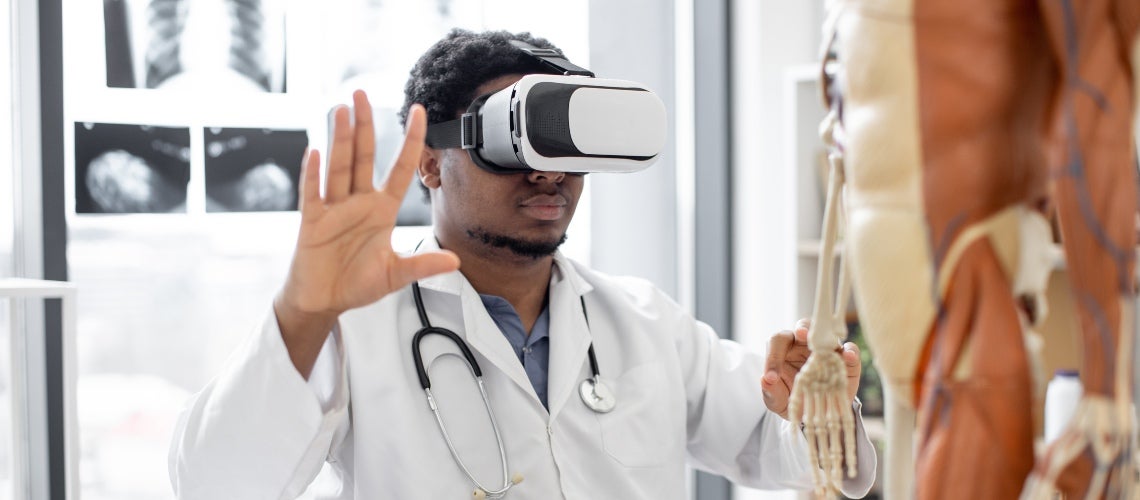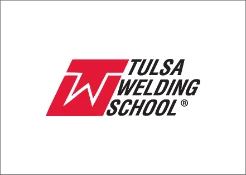 The metaverse has the potential to revolutionize skills and workforce development in fields such as health care. Copyright: SofikoS/Shutterstock
The metaverse has the potential to revolutionize skills and workforce development in fields such as health care. Copyright: SofikoS/Shutterstock
The metaverse is revolutionizing skills and workforce development, reshaping learning in fields like auto-mechanics, health care, welding and various vocations. It offers future workers with invaluable, cost-effective, flexible, standardized and safe apprenticeship opportunities tailored for the demands of the global economy.
How can the metaverse revolutionize skills development?
The metaverse is a virtual world where people interact using technologies like virtual reality (VR) and augmented reality (AR), merging the digital and physical realms. It enables users to socialize, play, learn, and conduct business in a shared online and immersive environment that evokes the sensation of being physically present.
Given its importance and potential, the World Bank’s EdTech team, with support from a Digital Development Partnership Grant, has recently completed a knowledge pack (KP) that provides evidence and case studies showcasing the advantages and results of using the metaverse, notably virtual and extended reality (XR) labs, for workforce development and offers guidance on implementation and steps necessary to deploy this technology. XR is an umbrella term that encompasses all immersive technologies that blend physical and digital worlds, including virtual reality (VR), augmented reality (AR), and mixed reality (MR).
The KP compiles a catalog of available virtual and XR labs in the market in high-demand sectors, such as auto-mechanics, nursing, and welding. Overall, the metaverse is reshaping workforce development in three key aspects:
- Reducing risks and fostering safety: Some training situations and learning experiences may be dangerous or difficult to access (e.g., health care, welding training, emergency preparedness, mass disasters, etc.).
- Promoting technical proficiency: The metaverse allows for unlimited practice opportunities and can personalize the pace (and scenarios) of the learning experiences in a simulated environment.
- Enhancing efficiency and monitoring: Training in the metaverse requires less investment in inputs and consumables; allows for easier adjustments to changes in the industry and facilitates data collection and analysis on students’ use and performance.
Top employers are using the metaverse for workforce development at scale.
The metaverse goes beyond gaming. More and more private companies are using virtual and augmented reality for hands-on employee training.
| COMPANIES |
SCOPE |
LINKS OF INTEREST |
|
| |
Pilot training |
||
| |
Assembly training |
||
| |
Driving and logistics training |
||
| |
Welding, air conditioning, electrical, plumbing, auto-mechanics training courses |
||
| |
Welding, electrical and air conditioning repair training |
||
| |
Welding training |
||
| |
Cooking training |
||
|
|
Customer service training |
||
Developing economies are also beginning to use the metaverse actively for workforce development
For instance, the India Virtual Labs Project provides students with remote access to labs in various disciplines of science and engineering. Resources include animated demonstrations online via computer, smartphone or tablet—no extra setup needed. Rwanda Polytechnic, a public technical and vocational education and training institution in Rwanda, uses open-source virtual labs to train students to maintain and repair vehicle engine systems. Similarly, developing countries like Morocco, Nigeria, and Ghana are beginning to offer low-cost virtual laboratories, fostering interactive learning environments to develop technical skills.
| COUNTRY |
NAME |
OBJECTIVE |
| Ghana |
Practical science knowledge for upper secondary level. |
|
| India |
Virtual Labs Project |
Remote access to science and engineering labs for college and university students. |
| Morocco |
Design and Implementation of a Virtual Laboratory for Physics Subjects in Moroccan Universities |
Low-cost virtual lab in an interactive physics learning environment for first year bachelor’s students. |
| Nigeria |
Quality STEM lab for secondary school students. |
|
| Rwanda |
Vehicle engine system lab for automobile technology diploma students. |
The World Bank is actively supporting the use of metaverse for workforce development
The World Bank launched the ActiVaR Program (supported by Korea World Bank Partnership Facility) to aid countries in designing, implementing, and evaluating XR technology-based training initiatives for skills and workforce development. ActiVaR includes six Latin American technical universities benefiting over 600 students yearly with virtual labs. The program facilitated two immersive training courses in auto-mechanics and industrial risk prevention. Additionally, it is developing an XR training curriculum for young Caribbean fishermen to enhance their blue economy productively and sustainably with top-of-the-art fishing and navigation technology. Furthermore, ActiVaR promotes the use of virtual campuses for more engaging hybrid learning experiences in the metaverse. The ActiVaR program has the potential to scale up globally. Available evaluation results of the ActiVaR program indicate that immersive training can contribute to student learning by fostering student engagement and motivation and reducing training risks.
Despite their potential, there are some challenges to implement virtual laboratories at scale
The integration of the metaverse into workforce development programs holds immense promise, but it also comes with considerations that governments and institutions must navigate carefully. Firstly, a reliable and robust internet connection is crucial for seamless access to virtual and XR labs for downloading software applications and effective platform usage. Institutions should assess their hardware capabilities to ensure a smooth learning experience. Moreover, the importance of proper hygiene and safety in shared equipment like headsets cannot be understated. Teachers, as pivotal drivers of this transformation, may face challenges arising from unfamiliarity and limited training. Hence, their active involvement and proper training are essential.
Beyond these concerns, there are broader issues related to user privacy. Safeguarding data privacy and security in the metaverse should be a key priority, with robust measures in place to protect user information. Additionally, XR labs may occasionally trigger motion sickness due to a phenomenon known as “simulator sickness” or “cybersickness.” To mitigate discomfort, users should take breaks and gradually acclimate to the technology. By addressing these factors thoughtfully, governments and institutions can harness the full potential of the metaverse for workforce development while avoiding potential pitfalls.
You can already access and download the KP here. To learn more, you can also hear from the team who conducted the elaboration of the KP on this podcast.
To receive weekly articles, sign-up here












Join the Conversation